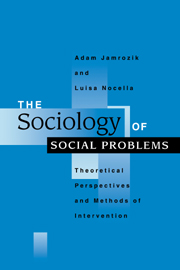Book contents
- Frontmatter
- Contents
- List of Tables
- List of Figures
- Preface and Acknowledgements
- 1 Introduction: Theoretical Perspectives on Social Problems
- 2 Contemporary Perspectives on Social Problems
- 3 Methods of Intervention in Social Problems
- 4 Social Actors in Social Problems
- 5 Challenges of Contemporary Social Problems
- 6 Social Problems in the Residualist Conversion Perspective
- 7 Inequality – The Underlying Universal Issue in Social Problems
- 8 The Social Construction of Family Problems
- 9 The Problem of Social Order
- 10 The Theory of Residualist Conversion: Does it Meet the Test?
- 11 Conclusions and Implications
- Bibliography
- Index
8 - The Social Construction of Family Problems
Published online by Cambridge University Press: 29 March 2011
- Frontmatter
- Contents
- List of Tables
- List of Figures
- Preface and Acknowledgements
- 1 Introduction: Theoretical Perspectives on Social Problems
- 2 Contemporary Perspectives on Social Problems
- 3 Methods of Intervention in Social Problems
- 4 Social Actors in Social Problems
- 5 Challenges of Contemporary Social Problems
- 6 Social Problems in the Residualist Conversion Perspective
- 7 Inequality – The Underlying Universal Issue in Social Problems
- 8 The Social Construction of Family Problems
- 9 The Problem of Social Order
- 10 The Theory of Residualist Conversion: Does it Meet the Test?
- 11 Conclusions and Implications
- Bibliography
- Index
Summary
The family has existed as a primary social institution since time immemorial and can be found in every part of the globe. As a primary social institution, the family possesses distinct relationships with society, the state and the market, and any concerns about the family are directly concerned with these relationships. The family becomes a ‘problem’ when it or the conditions within it present a threat to dominant values and interests. This threat emerges when the family is no longer able to fulfil the functions expected of it by the wider society. The pursuit of certain interests by society and the failure of some families to participate in the realisation of these interests result in the creation of a social residue in the form of the ‘problem family’.
This chapter provides an overview of the current socio-political response to the family, and examines the way in which both the family per se and perceived problems within it have been interpreted and addressed by society. A brief summary of recent changes in family composition and organisation is provided to demonstrate the way in which such changes have resulted in increasing concern over the ability of families to continue their socially expected functions. The relationship between the family and the state is examined, with the family identified as a primary site through which the state's interests in the maintenance of social order and the facilitation of market forces are achieved.
- Type
- Chapter
- Information
- The Sociology of Social ProblemsTheoretical Perspectives and Methods of Intervention, pp. 150 - 179Publisher: Cambridge University PressPrint publication year: 1998

